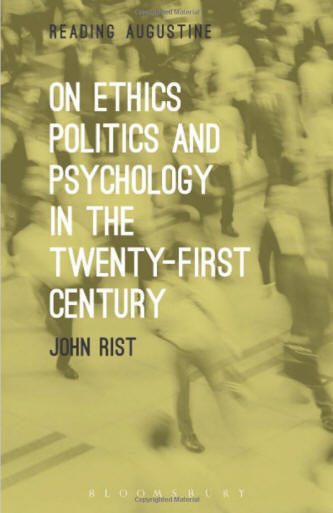Book Review
On Ethics, Politics And Psychology in the Twenty-First Century (Reading Augustine)
John Rist
Bloomsbury Academic (30 Nov 2017)
ISBN: 978-1501307492
(Also on Kindle)
 What
would Augustine have said about some of our contemporary challenges,
challenges that he might not have faced in his lifetime. In some ways, we
live in a world not unlike the world of his time. In other ways, things
are much worse: we appear to be living in a post-pagan world. The pagans
tried to live in accordance with the natural law. The secularists of our
day do not.
What
would Augustine have said about some of our contemporary challenges,
challenges that he might not have faced in his lifetime. In some ways, we
live in a world not unlike the world of his time. In other ways, things
are much worse: we appear to be living in a post-pagan world. The pagans
tried to live in accordance with the natural law. The secularists of our
day do not.
We have the great fortune in having perhaps the leading Augustine scholar answering this question. The book is convincing and, for the average reader, utterly readable.
Augustine has often been accused of undue pessimism about the human condition. Then again, secularists are not too far behind in this our post-Weinstein world. For Augustine, sin is very real. It impacts on the way we behave. An increasing number of secularists would hopefully agree with this.
Rist looks at what Augustine has to say about truth, love and evil. He gives Augustine the opportunity to examine and critique the various philosophical and theological tendencies of our age. Augustine would have had lots of negative things to say about Hobbes, Kant and Mill, for instance. In a medical ethics course I attended some years ago, these three were the main philosophers touted by the lecturers. Augustine would have had little time for them. He would also have had little time for so many of the theologians of the seventies who have done so much damage in the Church.
What we have here is a superb examination of what Augustine would say to our world. For example, he would remind us that human rights are not desires. A person may desire to abort her child or get married to a member of the same sex. But that person has no right to do so. Human rights are God given rights. They are metaphysical entities embodied in individuals. So much rights talks these days are incoherent. While Augustine therefore does not reject the notion of human rights, he would ask that ethics be based centrally on virtue, a tradition that goes back to Socrates and one that is rejected by so many intellectuals these days.
Particularly enjoyable is the last section on the pretend interview with the great man. It really reminds us how shallow the intellectuals of our day really are, let alone the parade of celebrities who are called to comment on metaphysical truths by equally confused members of the media.
In our mixed up world, Augustine is a remedy and what better way than to begin with this wonderful work.
Reviewed by Dr Pravin Thevathasan
